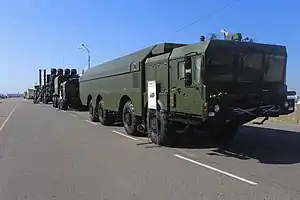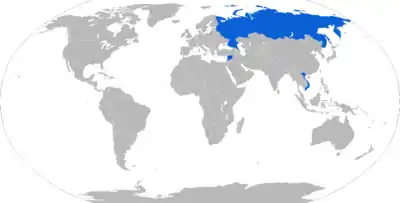K-300P Bastion-P
The K-300P Bastion-P (NATO reporting name SS-C-5 Stooge) is a Russian mobile coastal defence missile system. The system was developed together with the Belarusian company Tekhnosoyuzproekt.
| K-300P Bastion-P | |
|---|---|
 Bastion coastal missile system with Yakhont anti-ship missile. | |
| Type | Mobile anti-ship and surface to surface missile system |
| Place of origin | Russia |
| Service history | |
| In service | 2015-present |
| Used by | Russia, Vietnam, Syria |
| Wars | Syrian Civil War |
| Production history | |
| Manufacturer | NPO Mashinostroenia |
| Produced | 2010 |
| Specifications | |
| Mass | 3,000 kg |
| Length | 8.9 m |
| Diameter | 0.7 m |
| Warhead | 250 kg semi-armour piercing HE |
Detonation mechanism | delay fuze |
| Engine | ramjet 4 tons of thrust |
| Wingspan | 1.7 m |
| Propellant | kerosene |
Operational range | 350 km against sea targets 450 km against ground targets |
| Flight ceiling | 14,000 m |
| Maximum speed | Mach 2.5 |
Guidance system | active-passive radar seeker head |
Launch platform | coastal installations |
Design
The main role of the Bastion-P is to engage surface ships including carrier battle groups, convoys, and landing craft. A typical battery is composed of 1-2 command and control vehicles based on the Kamaz 43101 6×6 truck, one support vehicle, four launcher vehicles based on the MZKT-7930 8×8 chassis each operated by a 3-man crew and holding two missiles, and four loader vehicles; launcher vehicles can be located up to 25 km (16 mi) away from the C2 vehicles. Upon halting, missiles can be readied for firing within five minutes, and both fired in 2-5 second intervals. The mobile launcher can remain on active standby over a period of 3–5 days, or up to 30 days when accompanied by a combat duty support vehicle.[1][2]
The missile used by the Bastion-P is the P-800 Oniks, a supersonic anti-ship missile with a 200–250 kg (440–550 lb) warhead. They are fired vertically from the launchers using a solid-fuel rocket booster for initial acceleration, then use a liquid-fuel ramjet for sustained cruising at Mach 2.5. The Oniks/Yakhont's maximum range varies at 120–300 km (75–186 mi; 65–162 nmi) using a low-low or hi-low flight trajectory respectively. Using GLONASS at the initial flight stage and active radar guidance when approaching a target, the missile can fly to an altitude of 14,000 m (46,000 ft) before descending to sea-skimming altitude of 5 m at the final stage, useful up to sea state 7.[1][2] "These complexes are able to destroy both sea and ground targets at a distance of 350 kilometers at sea and almost 450 kilometers over land," Defense Minister Shoigu said at Russian President Vladimir Putin's meeting with representatives of the Defense Ministry.
Operational history
On 2 March 2011, it was reported that Russia would be deploying the system on the Kuril Islands in the Far East.[3] The deployment was finally conducted in 2016.
On 15 March 2015, it was reported that Russia had deployed the system in the Crimea.[4][5] Silo-based missile complex should be deployed on Object 100 by 2020.[6]
In 2015 Russian Northern Fleet Commander Adm. Vladimir Korolev said that Russia's Northern Fleet's Coastal Forces would receive new Bastion anti-ship missile complexes to support already existing S-400 deployments.[7][8]
On 15 November 2016, Russia announced it had deployed K-300P Bastion-P systems to Syria, where it fired Oniks missiles at land targets[9] as part of the Russian military intervention in Syria, demonstrating a previously undisclosed land attack capability for the coastal defense system; the P-800 uses a combination of autopilot, INS, and a radio altimeter for mid-course guidance and a monopulse dual-mode active/passive seeker for terminal guidance. Modified software in the Bastion's guidance system enables the missiles to dive onto stationary land targets, striking programmed coordinates.[10][11]
Variants
Operators

See also
References
- Bastion-P Costal defense missile system - Military-Today.com
- 3K55 Bastion - Weaponsystems.net
- "Russia to deploy Bastion coastal missile systems at Kurils". Rusnavy.com. 3 February 2011. Retrieved 3 September 2013.
- Smith-Spark, Laura; Eshchenko, Alla; Burrows, Emma (16 March 2015). "Russia was ready to put nuclear forces on alert over Crimea, Putin says". CNN. Retrieved 16 March 2015.
In the documentary, Putin said Russia's Bastion high-precision coastal missile defense systems had been deployed to Crimea to protect the territory -- 'in such a way that they were seen perfectly well from outer space.'
- "Russia deployed Bastion coastal missile systems on Crimean peninsula". spiegel.de. 15 March 2015. Retrieved 15 March 2015.
- В Крыму восстановлена боеготовность шахтного берегового ракетного комплекса "Утес"
- Bora, Kukil (1 June 2015). "Russian Military To Deploy Bastion Anti-Ship Missile Complexes In Arctic In 2015". International Business Times. Retrieved 19 July 2019.
- Henderson, Isaiah M. (18 July 2019). "Cold Ambition: The New Geopolitical Faultline". The California Review. Retrieved 19 July 2019.
- https://www.middleeastobserver.org/2016/11/15/putin-orders-bombing-aircraft-carrier-syria-hours-after-call-with-trump/
- "Russia reveals Bastion-P deployment, land attack role in Syria". Jane's Information Group. 16 November 2016. Retrieved 16 November 2016.
- Bastion coastal defense missile system proves land attack capability in Syria Archived 13 December 2016 at the Wayback Machine - Armyrecognition.com, 25 November 2016
- https://tass.com/defense/1249921
- http://thediplomat.com/2016/08/vietnam-deploys-precision-guided-rocket-artillery-in-south-china-sea/